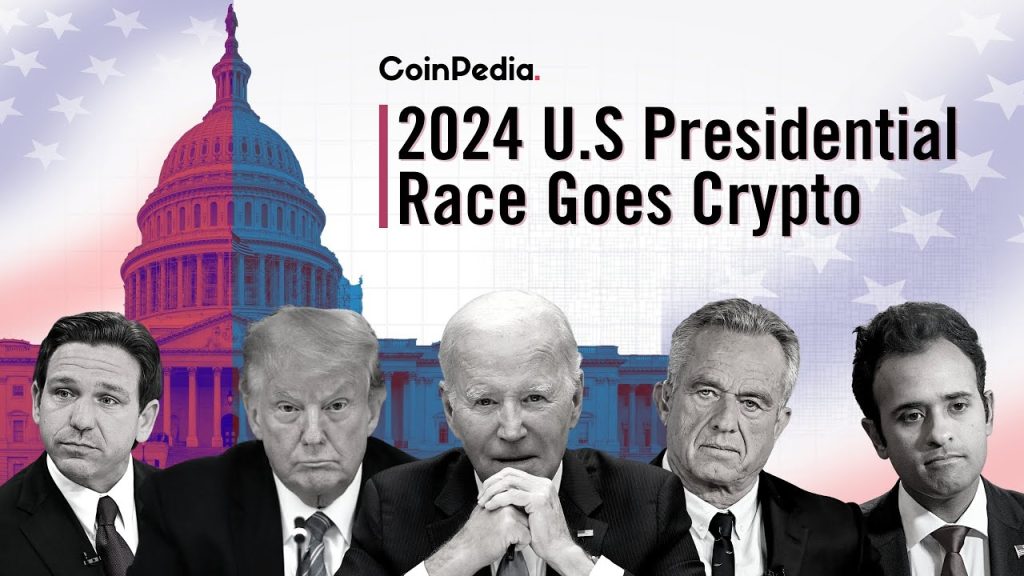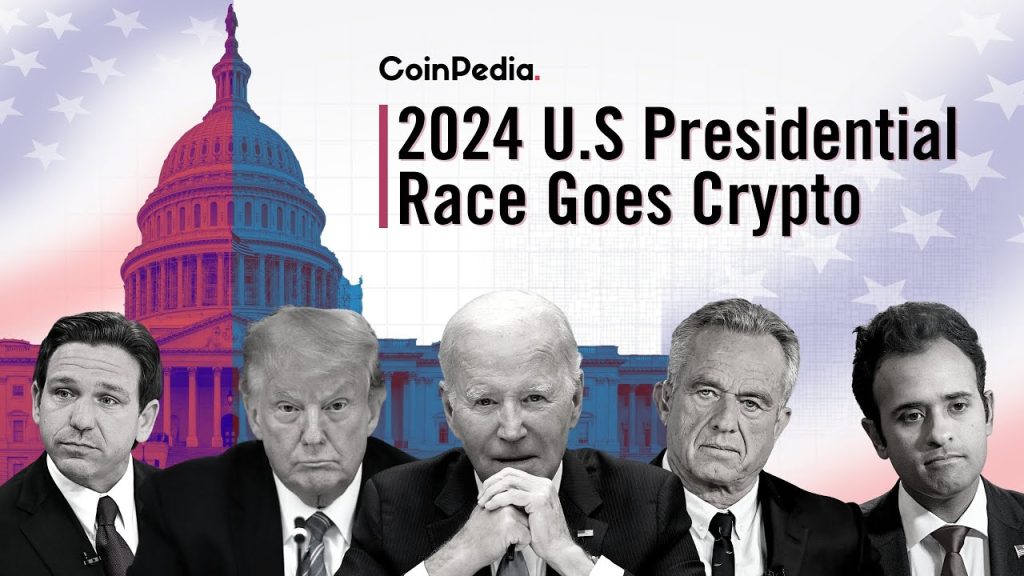The 2024 US Presidential Election: Where US Presidential Candidates Stand on Cryptocurrency Policies


The post The 2024 US Presidential Election: Where US Presidential Candidates Stand on Cryptocurrency Policies appeared first on Coinpedia Fintech News
The Upcoming 2024 U.S. presidential elections are around the corner & the fate of cryptocurrency is closely tied to the potential presidential Candidates & their stance regarding the future of Cryptocurrency.
Recently, President Joe Biden signed an Executive order directing the Federal Government to come up with a plan to regulate cryptocurrencies.
In reply to that, Donald Trump sees Bitcoin as a scam; he wants the dollar to be the currency of the World.
Opposing the thoughts of Donald Trump – Robert F. Kennedy Jr. says that as president, “I will make sure that your right to hold & use bitcoin is inviolable.”
There is no doubt that clear & favourable crypto regulation could ignite the next crypto bull run.
So, the question echoes through the minds of every crypto investor and enthusiast: Is Donald Trump better than Robert F. Kennedy Jr. for the crypto industry?
Or maybe it’s Joe Biden or someone else entirely?
As a crypto investor, it’s crucial to understand where each candidate stands regarding Bitcoin and cryptocurrencies.
But, firstly, let’s understand why the 2024 U.S. election is so significant for cryptocurrency.
Why the 2024 US Election Matters for Crypto?
For nearly a decade, U.S. regulators have been trying to make it harder for cryptocurrency businesses to use regular banks.
Their goal?
To slow down the cryptocurrency industry and prevent problems like the recent FTX collapse.
Since October 2020, the Securities and Exchange Commission, or SEC, began focusing more on cryptocurrency. They’ve been telling digital asset companies what they can and can’t do almost every week.
Leading to this strict regulation is SEC Chairman Gary Gensler, who wants strict rules to keep people safe. But this crackdown is affecting big companies like Coinbase and Binance. They’re struggling with all the new rules.
Some people think that things might get easier only if a pro-crypto candidate wins in the upcoming election.
Right now, there are five main people running.
On the Democratic side, it’s President Joe Biden and Robert F. Kennedy Jr. Among the Republicans it’s former President Donald Trump, Vivek Ramaswamy, a biotech entrepreneur, and Ron DeSantis, the Governor of Florida.
So, let’s see where their views stand regarding the crypto industry.
Joe Biden (D)
Starting with the current President of the U.S., Joe Biden, a Democrat running for re-election. It’s somewhat tricky to label Joe Biden as crypto-friendly.
His first term in office has shown us that cryptocurrency innovation isn’t a top priority for him compared to other issues. However, it’s worth noting that in 2020, one of his major campaign donors was Sam Bankman-Fried from FTX, a prominent crypto exchange.
Despite this, President Biden’s primary concern has been on stopping people from using crypto to avoid paying taxes. At a G7 summit in Japan, he made it crystal clear that he’s not keen on making deals that protect wealthy tax evaders and crypto traders.
Earlier this year, he introduced some new cryptocurrency regulations, including a 30% tax on the energy used for crypto mining.
Interestingly, President Biden was the one who appointed Gary Gensler as the Chairman of the SEC, whose stance has always been against the crypto industry. While some are concerned that these rules could slow down how fast crypto grows in the U.S.
If Joe Biden secures a second term, he could potentially introduce even stricter rules, presenting further challenges for the crypto industry.
Robert F. Kennedy Jr. (D)
When it comes to the Democratic nomination, Robert F. Kennedy Jr., known as RFK Jr., stands as a potential contender.
What sets RFK Jr. apart is his stance against centralized power. He is personally aware of just how powerful some parts of the government can be.
RFK Jr. sees decentralized currency as a way to take power away from the government, particularly the powerful Central Bank. This is why he’s a supporter of Bitcoin.
Recently, he addressed a Bitcoin conference and used the example of Canadian truckers to illustrate how Bitcoin can benefit people, not just a select few, but everyone.
In a speech, he promised to create a law to protect people’s cryptocurrency rights. He even pledged to accept campaign donations in Bitcoin, using the Lightning Network.
Moreover, After the Bitcoin Conference in Miami this May, Kennedy bought 14 Bitcoins as a special gift for his kids. It’s like giving them a piece of the digital future!
RFK Jr. emerges as a strong contender with his clear support for crypto and his reservations about Central Bank Digital Currencies (CBDCs). While his nomination as the Democratic candidate remains uncertain, his popularity hints at the possibility of a crypto-friendly candidate emerging in the future.
Donald Trump (R)
Now, let’s talk about another person running for president: former President Donald Trump.
Over time, Trump’s crypto stance changed a lot, especially in 2016 when he called for all campaign donations to be made in crypto to keep banks out of it. This move appeared to be in favor of cryptocurrency, as the Republican party is seen as supporting crypto.
Interestingly, When he won the election in 2016, the crypto market did well, even though he hadn’t spoken much about cryptocurrency during his campaign. However, things became clearer in 2019, nearly three years into his presidency.
When Trump took to Twitter to express his thoughts, they weren’t exactly crypto-friendly. He stated his dislike for Bitcoin and other cryptocurrencies, labelling them as not real money, with volatile values, and potential for illegal activities like drug trading.
He thinks America should have the USD Dollar as a strong currency. Trump’s views on Bitcoin have always leaned towards not liking it. Surprisingly, Trump’s position on crypto and financial freedom aligns with Biden’s despite their different ideologies.
Both could lead to restrictions on crypto and the advancement of a digital dollar.
Ron DeSantis (R)
Speaking of Miami, Florida Governor Ron DeSantis is currently the runner-up on the Republican side in contrast to RFK Jr. Ron DeSantis is a seasoned politician with over a decade of experience in Florida’s political arena.
Before that, he served for nearly a decade in the U.S. Navy, achieving significant ranks. This year in March, Ron DeSantis made headlines by announcing his intention to pass a law banning Central Bank Digital Currencies (CBDCs) in his state.
Later in May, he took to Twitter to criticize the Federal Reserve for suggesting it could create a digital dollar without Congressional approval.
The result?
Ron successfully passed a law against CBDCs in Florida. Ron seems to understand that CBDCs can be used to control people’s money and push certain ideas.
While Ron DeSantis’s crypto stance may not be as well-defined as other top presidential candidates, it’s evident that he is firmly against CBDCs, and that’s an important point to consider.
Vivek Ramaswamy (R)
Lastly, we have Vivek Ramaswamy, a businessman with no political background who recently surged in polls due to his popular policies.
What sets Vivek Ramaswamy apart is his genuine support for Bitcoin. Vivek Ramaswamy isn’t afraid to voice his concerns about the people who make the rules governing cryptocurrencies like Bitcoin.
Recently, Ramaswamy celebrated a favourable verdict for Grayscale, a leading crypto asset manager; the decision said that the SEC couldn’t stop Grayscale from doing certain things with Bitcoin.
This shows he likes crypto, and many people who like crypto like that, too. Adding to his crypto-friendly reputation, Ramaswamy’s announcement of an upcoming crypto policy blueprint has piqued the interest of many.
It hints at a future where cryptocurrency and politics converge more closely. Well, we can say he understands the importance of cryptocurrency’s decentralized nature and stands as a strong contender for crypto enthusiasts.
Conclusion
The choice between U.S. presidential candidates is complex, and their impact on crypto and financial freedom varies.
Now, we’d like to hear from you. Who do you believe is pro-crypto, and who leans anti-CBDC?
Share your thoughts in the comments below.


